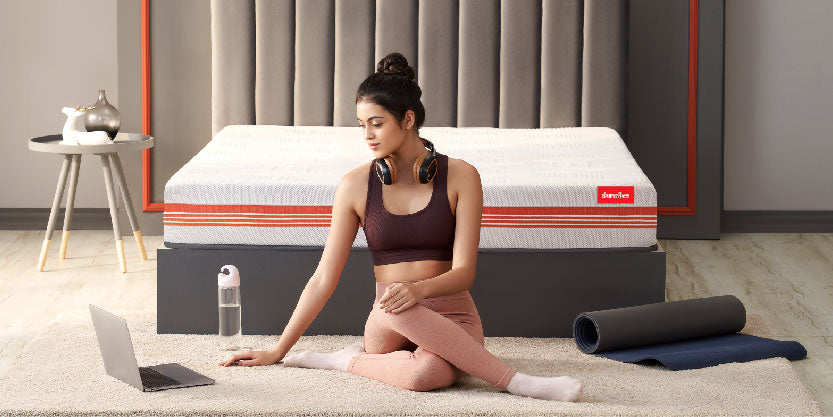Experts believe that about 80% of people experience back pain at some point in their lives. In India itself, disability caused by lower back pain is the fourth highest cause of disability after anaemia, migraine and musculo-skeletal disorders.
ALL ABOUT BACK PAIN
Our backbone i.e. our spine is divided into four parts. The neck (cervical spine), upper back (thoracic spine ), the lower back (lumbar spine) and the tailbone (sacrum). Being the most mobile and weight bearing parts of the spine, the neck and lower back are highly susceptible to injuries.Back pain most commonly stems from strain, stress, injury or overuse of the involved muscles. It is the second most common type of pain humans experience ( headache being the first). Though the back muscles are capable of healing in a few weeks with self-care, chronic back pain disorders might keep troubling you longer than you desire and the pain even when not chronic can be sharp and debilitating. It is therefore best to keep your back and spine in the best shape.
While it can get difficult to pinpoint the exact reason behind back pain, it is easy to keep a watch on your back health and prevent severe complications.
WHO ALL CAN GET AFFECTED?
Anyone can develop back pain, be it kids or adults. The risk of getting back pain increases with age. A 2017 survey by The Lancet that evaluated patients who were seeking help for back or neck problems concluded that almost 3/4th patients had lower back issues and around 45% waited for 7 seven weeks before seeking assistance. Also surprisingly, every 5th patient was aged between 16-34. This shift is certainly the result of the current lifestyle that continues to put unwanted pressure on the spine.
HOW BACK PAIN IMPACTS YOUR OVERALL HEALTH?
Back pain has a tendency to affect us not just physically but also emotionally. Chronic back pain can substantially impact your quality of life by affecting your sleep, causing immobility, decreasing appetite and even impacting your cognitive functions like thinking, concentrating and focusing. It can also make you moody and depressed by impacting your emotional state and social relationships.
SYMPTOMS & COMPLICATIONS
Back pain can be triggered by a number of factors with symptoms varying in intensity from mild to severe.
Lower back pain is the most common type of back pain that can be caused by extensive stretching of the muscles that hold your spinal column correctly. This can make the spine become slightly unstable resulting in lower back pain. Poor posture, extreme physical exertion, being overweight, emotional stress and sitting in one position for long hours can be some of the other common causes of this kind of pain. The symptoms can range from pain and stiffness in the back to pain in the leg and back of the thighs. The pain can worsen while stretching or bending.
The symptoms that can indicate a serious complication and require immediate medical attention are:
- A feeling numbness, weakness or tingling sensation in one or both the legs
- Problem controlling your bowel or bladder
- The pain extending down to the legs
- Unexplained weight loss
- Fever accompanied by back pain
HOW TO AVOID BACK PAIN?
The best way to prevent backache is to keep your back muscles strong. The following simple self-help strategies can be surprisingly helpful in keeping a check on everyday back strain and stress:
-
Exercise:
Lack of physical activity and your desk job can contribute to back pain. Start small with brisk walking to help increase the blood flow to your spine and stretch your muscles. As your comfort level increases, move to yoga, pilates or weight-bearing exercises to further condition the muscles that support your spine. -
Eat Right:
Drink lots of water and consume a balanced diet. Being overweight can cause strain on your back which makes maintaining a healthy weight quite crucial. -
Posture:
Practicing a good posture helps maintain the natural shape of your spine, helping it stay strong. As we spend hours in front of laptop and mobile screens, it is easier than before to slouch and damage our backs. So be sure you have an ergonomic work space and you take frequent breaks and do some basic stretching exercises. -
Sleeping Position:
Getting 7 to 8 hours of quality sleep is important for good back health. Sleeping on the side on a supportive mattress is suggested by most experts for people prone to back pain. If you must sleep in some other position it is recommended to make sure your back is well supported with a suitable orthopedic mattress designed to lend enhanced support to the back. -
Lifting & Handling:
Think before you lift heavy objects and know your limits. Start with a proper position and let your legs take the strain rather than your back. Don’t twist and tighten your core muscles. -
Reduce Stress:
Not many people know that stress can cause you to tense or tighten your muscles. The constantly tensed muscles can cause back pain. The pain can be both physical and psychological and can only get worse if not treated properly. Hence it is advisable to stay calm and seek out diagnosis from a specialist on time. -
Lifestyle Changes:
Incorporating some healthy lifestyle habits can also help prevent back problems that are triggered by our own actions. This includes not carrying an overstuffed wallet in your back pocket for a prolonged period of time, choosing the right bag that balances weight on both the shoulders, avoid carrying a heavy bag without supportive straps on your back and listening to your body by respecting its limits.
While you can prevent back pain via these simple lifestyle changes, it is also important to not ignore it for long. Consult an orthopedist whenever you feel you are not able to deal with pain as it might be caused by an underlying disorder.
Nowadays problems like cervical pain, spondylolisthesis, spinal arthritis and herniated disk are quite common and need to be addressed immediately. Orthopedists are able to recommend a suitable treatment based on the patient’s medical history and severity of the pain.
SLEEP & RECOVER BETTER WITH DUROFLEX
If you are looking for a mattress designed to deliver better sleep with advanced back support all around the year then consider Duropedic.
It is India’s only certified range of orthopaedic mattresses that is tested and recommended by the renowned orthopaedists at the National Health Academy for its advanced 5-zoned orthopaedic support that helps in relieving back pain, providing daily postural correction and proper alignment of the spine.


















